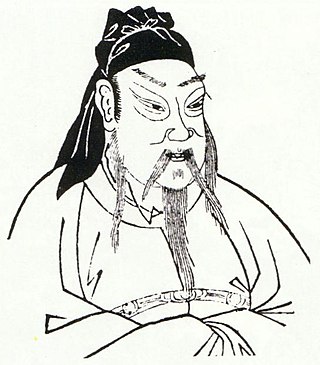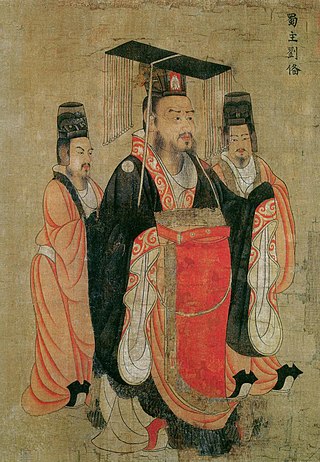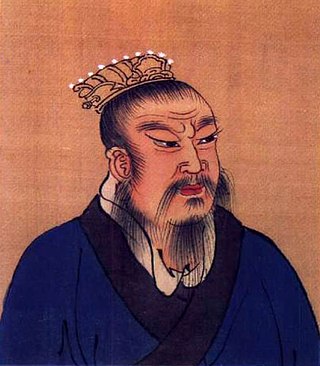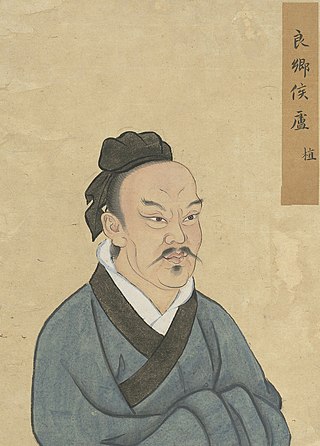Related Research Articles

Guan Yu,courtesy name Yunchang,was a Chinese military general serving under the warlord Liu Bei during the late Eastern Han dynasty of China. Along with Zhang Fei,he shared a brotherly relationship with Liu Bei and accompanied him on most of his early exploits. Guan Yu played a significant role in the events leading up to the end of the Han dynasty and the establishment of Liu Bei's state of Shu Han during the Three Kingdoms period. While he is remembered for his loyalty towards Liu Bei,he is also known for repaying Cao Cao's kindness by slaying Yan Liang,a general under Cao Cao's rival Yuan Shao,at the Battle of Boma. After Liu Bei gained control of Yi Province in 214,Guan Yu remained in Jing Province to govern and defend the area for about seven years. In 219,while he was away fighting Cao Cao's forces at the Battle of Fancheng,Liu Bei's ally Sun Quan broke the Sun–Liu alliance and sent his general LüMeng to conquer Liu Bei's territories in Jing Province. By the time Guan Yu found out about the loss of Jing Province after his defeat at Fancheng,it was too late. He was subsequently captured in an ambush by Sun Quan's forces and executed.

The Yellow Turban Rebellion,alternatively translated as the Yellow Scarves Rebellion,was a peasant revolt during the late Eastern Han dynasty of ancient China. The uprising broke out in 184 CE,during the reign of Emperor Ling. Although the main rebellion was suppressed by 185 CE,it took 21 years for full suppression of resistant areas and emerging rebellions by 205 CE. The weakening of the imperial court and the rising political influence of ultra-autonomous regional military-governors,who helped suppress the rebellion,eventually led to rampant warlord dominance and the resultant Three Kingdoms period.

Liu Bei,courtesy name Xuande (玄德),was a Chinese warlord in the late Eastern Han dynasty who later became the founding emperor of Shu Han,one of the Three Kingdoms of China.

Emperor Gaozu of Han,also known by his given name Liu Bang (劉邦),was the founder and first emperor of the Han dynasty,reigning from 202 to 195 BC. He is considered by traditional Chinese historiography to be one of the greatest emperors in history,credited with establishing the first Pax Sinica,one of China's longest golden ages.
Liu Bian,also known as Emperor Shao of Han and the Prince of Hongnong,was the 13th emperor of the Eastern Han dynasty in China. He became emperor around the age of 13 upon the death of his father,Emperor Ling,and ruled briefly from 15 May to 28 September 189 before he was deposed,after which he became known as the "Prince of Hongnong". His emperor title,"Emperor Shao",was also used by other emperors who were in power for very short periods of time. In March 190,he was poisoned by Dong Zhuo,the warlord who deposed him and replaced him with his younger half-brother,Liu Xie.
Cao Rui,courtesy name Yuanzhong,was the second emperor of the state of Cao Wei during the Three Kingdoms period. His parentage is in dispute:his mother,Lady Zhen,was Yuan Xi's wife,but she later remarried Cao Pi,the first ruler of Wei. Based on conflicting accounts of his age,Pei Songzhi calculated that,in order to be Cao Pi's son,Cao Rui could not have been 36 when he died as recorded,so the recorded age was in error;late-Qing scholar Lu Bi and Mou Guangsheng argued instead that Cao Rui was Yuan Xi's son.

Li Jue,courtesy name Zhiran,was a Chinese military general,politician,and warlord serving under the autocratic warlord Dong Zhuo during the late Eastern Han dynasty of China. He later succeeded Dong Zhuo as the leader of the Liang Province faction after Dong Zhuo was murdered in a coup d'état,and was able to take over the Han imperial capital Chang'an,keeping Emperor Xian as a hostage. Despite being adept in military affairs,he was inept at politics,quarrelling with his fellow generals and making the bad decision to let Emperor Xian escape,greatly decreasing his power and precipitating his downfall.

Lu Zhi,courtesy name Zigan,was a Chinese historian,military general,philosopher,and politician during the Eastern Han dynasty. According to the Records of the Three Kingdoms,he was the mentor of Liu Bei and Gongsun Zan. He was described as a tall man with a sonorous voice.
The Ten Attendants,also known as the Ten Eunuchs,were a group of influential eunuch-officials in the imperial court of Emperor Ling in Eastern Han China. Although they are often referred to as a group of 10,there were actually 12 of them,and all held the position of zhong changshi in Emperor Ling's imperial court.
Dou Wu,courtesy name Youping (游平),was a Chinese philosopher and politician of the Eastern Han dynasty. He was known as a Confucian scholar and served as a low-level official during the reign of Emperor Huan until his daughter Dou Miao was elevated from imperial consort to empress,which caused him to be promoted,eventually to become one of the most important imperial officials when his daughter became empress dowager and regent for Emperor Ling. He,along with Chen Fan,attempted to curb the eunuchs' power and install Confucian scholars in imperial government,but after a plot by him and Chen to exterminate the most powerful eunuchs was discovered,he was defeated in battle and committed suicide.
Wang Lang,courtesy name Jingxing (景興),was a Chinese politician and minor warlord who lived during the late Eastern Han dynasty of China. He served notably in the Han central government as Administrator of Kuaiji Commandery and in the later state of Cao Wei during the Three Kingdoms period. He was also a maternal great-grandfather of Sima Yan,the founding emperor of the Jin dynasty,through his granddaughter Wang Yuanji's marriage with Sima Zhao.
Huangfu Song,courtesy name Yizhen,was a military general who lived during the Eastern Han dynasty of China. He is best known for helping to suppress the Yellow Turban Rebellion and Liang Province Rebellion. He was one of three imperial commanders when the Yellow Turban Rebellion broke out,along with Zhu Jun and Lu Zhi. He was known to be a modest and generous person. Lu Zhi was removed from command after the eunuch Zuo Feng (左豐) made false accusations against him;Lu Zhi had refused to bribe Zuo Feng. Huangfu Song,who took over command of the imperial troops from Lu Zhi,continued to use Lu as a strategist and reported his contributions to the imperial court. Thus,in the same year,Lu Zhi regained his post as Master of Writing (尚书).

Three Kingdoms is a 2010 Chinese television series based on the events in the late Eastern Han dynasty and the Three Kingdoms period. The plot is adapted from the 14th century historical novel Romance of the Three Kingdoms and other stories about the Three Kingdoms period. Directed by Gao Xixi,the series had a budget of over 160 million RMB and took five years of pre-production work. Shooting of the series commenced in October 2008,and it was released in China in May 2010.
Liu Ye,courtesy name Ziyang,was an adviser to the warlord Cao Cao during the late Eastern Han dynasty of China. After the fall of the Eastern Han dynasty,he served as an official in the state of Cao Wei during the Three Kingdoms period,serving under Cao Pi and Cao Rui. He was a member of the House of Liu,the imperial clan of the Han dynasty,and a direct descendant of Emperor Guangwu,via Guangwu's seventh son Liu Yan. He had two sons:Liu Yu (劉寓) and Liu Tao (劉陶).

Qutu Tong,titled Duke of Jiang,Xianbei name Tandouba (坦豆拔),was a general in the Sui and Tang dynasties of China. He was listed as one of 24 founding officials of the Tang dynasty honored on the Lingyan Pavilion due to his contributions in wars during the transitional period from Sui to Tang.
Zhang Xutuo,courtesy name Guo,was one of the most celebrated generals during the Sui dynasty. He was best known for his achievements in suppressing rebellions and uprisings during Emperor Yang's reign.
Li Miao,courtesy name Hannan,was an official of the state of Shu Han during the Three Kingdoms period of China. He previously served under the warlord Liu Zhang and later Liu Bei in the late Eastern Han dynasty.
Zhuge Jing,courtesy name Zhongsi,was a Chinese military general and politician of Eastern Wu during the Three Kingdoms period of China. Though originally from Cao Wei,he was sent to Wu as a hostage during the rebellion of his father,Zhuge Dan,in 257. After his father's death in 258,Zhuge Jing continued to stay in Wu where he served as a general until the state's demise in 280 which ended the Three Kingdoms.
Wu Yan,courtesy name Shize,was a military general of Eastern Wu during the Three Kingdoms period of China and later for the Jin dynasty (266–420). He is most known for his valiant defence of Jianping during Jin's conquest of Wu. After Wu fell,Wu Yan served in administrative positions under Jin,with his most notable being the Inspector of Jiaozhou,succeeding Tao Huang,who was also a former official of Wu.
Gou Xi,courtesy name Daojiang,was a Chinese military commander of the Western Jin Dynasty. He came to prominence as a general under the Prince of Donghai,Sima Yue,after he quelled the rebellions of Gongshi Fan (公師藩),Ji Sang and Shi Le. Sima Yue initially valued Gou Xi,but after Gou Xi was constantly antagonized by Yue,their relationship broke down in 310. Gou Xi plotted with Emperor Huai of Jin to overthrow Yue from power,which caused Yue to die of stress shortly after,and Gou Xi being instated to the positions of Grand General and Grand Commander. However,their victory was short-lived due to the Disaster of Yongjia,which saw Emperor Huai and Luoyang’s capture at the hands of Han-Zhao forces in 311. That same year,Gou Xi was captured and later executed by Shi Le.
References
- ↑ (帝遣小黄门左丰诣军观贼形埶,或劝植以赂送丰,植不肯。丰还言于帝曰:“广宗贼易破耳。卢中郎固垒息军,以待天诛。”帝怒,遂槛车征植,减死罪一等。) Houhanshu, vol.64